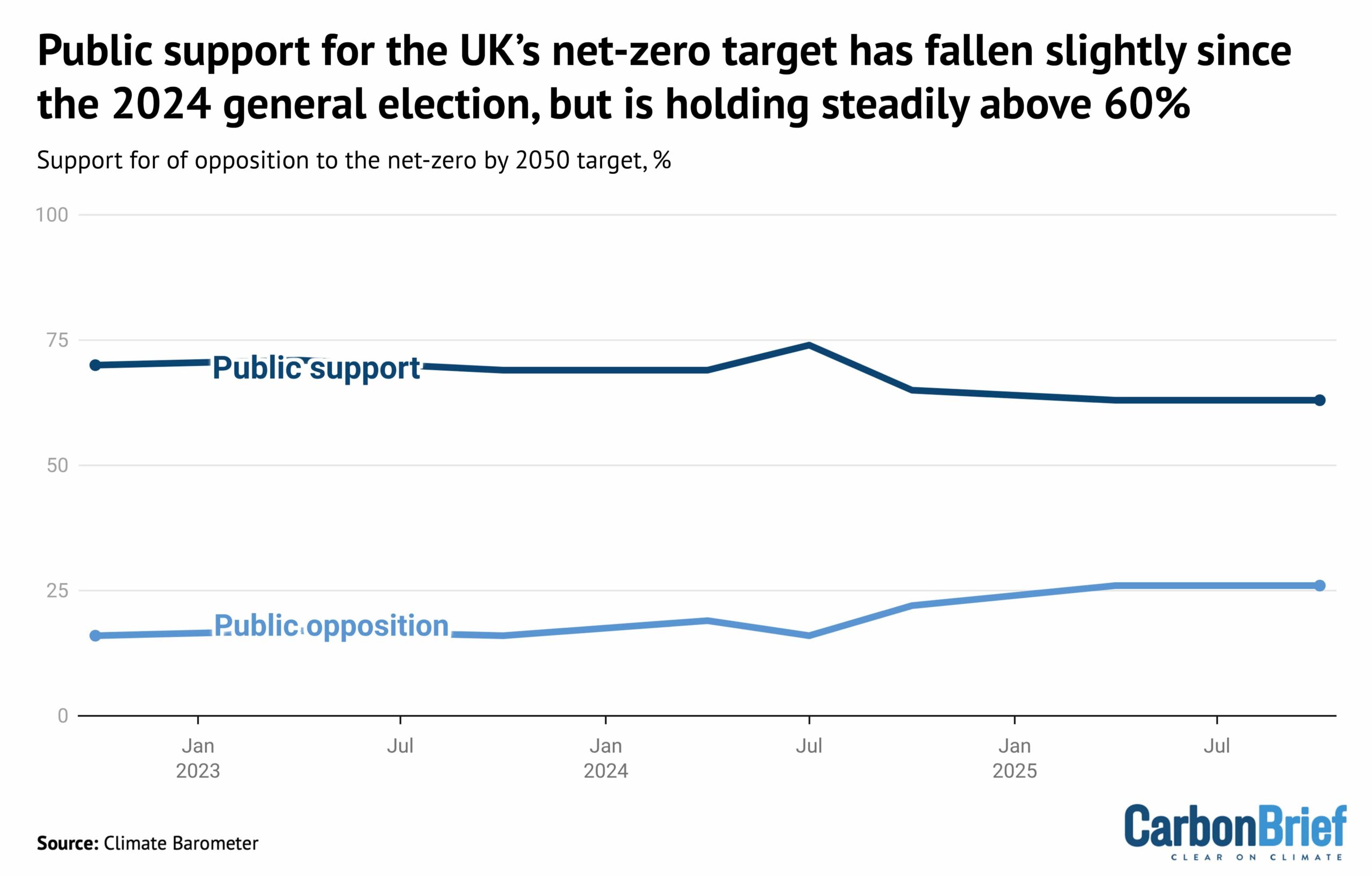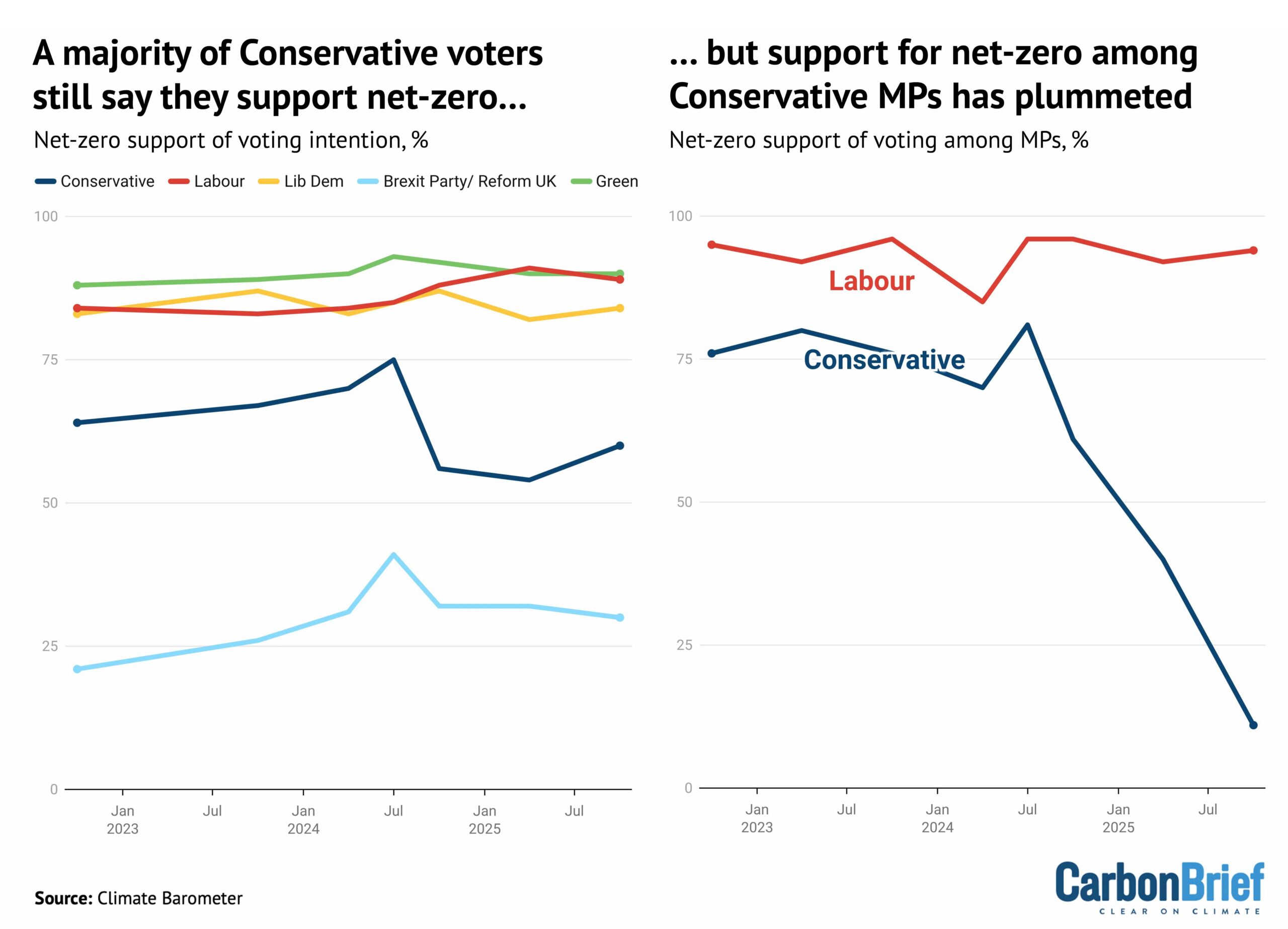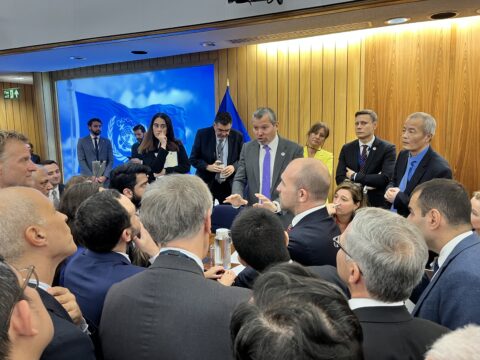A push to get rich nations to end their export credit support for overseas oil and gas projects has failed, after opposition from South Korea and Türkiye – and only late and lukewarm support from the United States.
The European Union, UK, Canada and Norway have been trying to get the 38 countries in the Organisation for Economic Co-Operation and Development (OECD) to agree to expand a 2021 ban on support for coal to the other planet-heating fossil fuels – oil and gas.
But South Korea and Türkiye opposed this effort, according to a document released by a South Korean government agency and seen by Climate Home. With pro-fossil fuel Donald Trump becoming US president on January 20, campaigners following the OECD talks said negotiators had given up trying to reach a deal.
An OECD spokesperson confirmed on Tuesday that governments had been “unable to reach an agreement to further restrict the provision of support for fossil-fuel related projects”, although “this issue may be revisited in the future”. Talks will continue in March but, because of Trump’s election as the incoming US leader, expectations of a breakthrough are low.
Missed chance
Climate campaigners lamented the lack of progress by OECD countries before Trump takes office. Kate DeAngelis, deputy director of international finance at Friends of the Earth US, said she had been “pretty hopeful that they were going to reach a deal” but “in the end, they failed”.
Dongjae Oh, gas lead at Korean campaign group Solutions for Our Climate, told Climate Home that “given the change in US administration, the 2024 momentum was a key moment for positive change – and it has been deeply regrettable to see talks stall, even with the majority of countries supporting the fossil fuel-finance restrictions”.
According to analysis from Oil Change International, the export credit agencies of OECD governments provide about $40 billion in support to foreign fossil fuel projects every year, with the vast majority going to oil and gas projects.
For example, before it promised to end support for fossil fuels in 2021, the UK’s export credit agency provided $300 million in loans to British companies working on a project to extract gas in Mozambique.
A joint UK-Canadian proposal and a separate one from the European Union would have committed governments – with some exceptions – to end their support for foreign projects that produce, transport, store, refine or distribute fossil fuels.
Opponents revealed
These OECD negotiations take place in secret, with no journalists or observers allowed to attend. But the Korean Trade Insurance Corporation (K-SURE) was present at the negotiations in March and June 2024. The organisation wrote up a summary of the talks and countries’ positions, which was released to a member of the Korean National Assembly – and an English translation has been seen by Climate Home.
It said that South Korea, Australia and Türkiye were opposed to the export credit proposals while the US, Japan and Switzerland were “reserved”.
According to K-SURE, South Korea argued that the ban would unfairly affect developing countries which are not members of the OECD and said there is a need to consider the pace of the green transition.
Record-hot 2024 shows world must adapt to extremes, says EU climate service
Türkiye said that fossil fuels should be reduced only gradually, without disrupting energy supply chains and energy security, and Australia said it was “unable to accept the current proposal”.
In March, according to K-SURE, the US argued that options other than a blanket ban should be considered, while Japan pushed for more exceptions and Switzerland wanted additional time for discussions between Swiss ministries.
In June, K-SURE reported that most countries other than South Korea and Türkiye agreed on the “fundamental direction” of the ban but differences remained on the details.
“South Korea conveyed its dissenting opinion,” K-SURE noted, while Türkiye said the proposal was “not feasible” because of national and energy security.
Trump deadline
The talks continued – and, according to DeAngelis, intensified after the election of Donald Trump on November 5 last year “put a fire under the Biden White House to take this seriously and really engage in the talks”.
Oil Change campaign strategist Adam McGibbon told Climate Home there were several rounds of talks throughout November and December, but those talks broke down without agreement on December 20.
McGibbon, DeAngelis and Oh criticised Türkiye and especially South Korea for opposing the agreement. South Korea is a leading producer of the ships that carry liquefied natural gas, and its export credit agencies often loan companies the money to buy them.
Oxfam: Super-rich have already burned more than their fair share of carbon for 2025
“Continuing to hinder global climate ambitions in the year ahead would be harmful both for domestic development and Korea’s global ambitions,” Oh said.
But DeAngelis believes the US should take “a lot of the blame” for only supporting the proposal late and for failing to persuade South Korea to agree to it, as she said the US had done for the previous OECD ban on coal finance.
Next steps
DeAngelis said that while the OECD talks seem to have stalled for at least the four-year period of Trump’s presidential term, climate campaigners would encourage countries to sign up individually to the Clean Energy Transition Partnership (CETP).
This initiative was launched at COP26 in 2021 and commits countries and public finance institutions to end overseas support for fossil fuels. Its members now number 41 after Norway and Australia joined at COP28. While the OECD only addresses export credit agencies, the CETP also includes support from development finance institutions and contributions to multilateral development banks.
Research released last August by the International Institute for Sustainable Development (IISD) found signatories were largely delivering on their promise, with their collective fossil fuel financing in 2023 amounting to $5.2 billion – a decrease of two thirds from the pre-CETP baseline. This, IISD said, was “a historic achievement”.
DeAngelis said campaigners are trying to get South Korea and Japan to join the CETP, particularly if there is a change of government in Korea after the current political turmoil triggered by the suspended president’s short-lived declaration of martial law.
The OECD spokesperson said that, when it comes to limiting international support for fossil fuel projects, any government “that wishes to do so is free to join those who have already voluntarily adopted more restrictive terms and conditions for such transactions”.
(Reporting by Joe Lo; editing by Megan Rowling)
The post Bid to end export credit help for oil and gas fails, with Korea and Türkiye opposed appeared first on Climate Home News.
Bid to end export credit help for oil and gas fails, with Korea and Türkiye opposed
Climate Change
Cheniere Energy Received $370 Million IRS Windfall for Using LNG as ‘Alternative’ Fuel
The country’s largest exporter of liquefied natural gas benefited from what critics say is a questionable IRS interpretation of tax credits.
Cheniere Energy, the largest producer and exporter of U.S. liquefied natural gas, received $370 million from the IRS in the first quarter of 2026, a payout that shipping experts, tax specialists and a U.S. senator say the company never should have received.
Cheniere Energy Received $370 Million IRS Windfall for Using LNG as ‘Alternative’ Fuel
Climate Change
DeBriefed 27 February 2026: Trump’s fossil-fuel talk | Modi-Lula rare-earth pact | Is there a UK ‘greenlash’?
Welcome to Carbon Brief’s DeBriefed.
An essential guide to the week’s key developments relating to climate change.
This week
Absolute State of the Union
‘DRILL, BABY’: US president Donald Trump “doubled down on his ‘drill, baby, drill’ agenda” in his State of the Union (SOTU) address, said the Los Angeles Times. He “tout[ed] his support of the fossil-fuel industry and renew[ed] his focus on electricity affordability”, reported the Financial Times. Trump also attacked the “green new scam”, noted Carbon Brief’s SOTU tracker.
COAL REPRIEVE: Earlier in the week, the Trump administration had watered down limits on mercury pollution from coal-fired power plants, reported the Financial Times. It remains “unclear” if this will be enough to prevent the decline of coal power, said Bloomberg, in the face of lower-cost gas and renewables. Reuters noted that US coal plants are “ageing”.
OIL STAY: The US Supreme Court agreed to hear arguments brought by the oil industry in a “major lawsuit”, reported the New York Times. The newspaper said the firms are attempting to head off dozens of other lawsuits at state level, relating to their role in global warming.
SHIP-SHILLING: The Trump administration is working to “kill” a global carbon levy on shipping “permanently”, reported Politico, after succeeding in delaying the measure late last year. The Guardian said US “bullying” could be “paying off”, after Panama signalled it was reversing its support for the levy in a proposal submitted to the UN shipping body.
Around the world
- RARE EARTHS: The governments of Brazil and India signed a deal on rare earths, said the Times of India, as well as agreeing to collaborate on renewable energy.
- HEAT ROLLBACK: German homes will be allowed to continue installing gas and oil heating, under watered-down government plans covered by Clean Energy Wire.
- BRAZIL FLOODS: At least 53 people died in floods in the state of Minas Gerais, after some areas saw 170mm of rain in a few hours, reported CNN Brasil.
- ITALY’S ATTACK: Italy is calling for the EU to “suspend” its emissions trading system (ETS) ahead of a review later this year, said Politico.
- COOKSTOVE CREDITS: The first-ever carbon credits under the Paris Agreement have been issued to a cookstove project in Myanmar, said Climate Home News.
- SAUDI SOLAR: Turkey has signed a “major” solar deal that will see Saudi firm ACWA building 2 gigawatts in the country, according to Agence France-Presse.
$467 billion
The profits made by five major oil firms since prices spiked following Russia’s invasion of Ukraine four years ago, according to a report by Global Witness covered by BusinessGreen.
Latest climate research
- Claims about the “fingerprint” of human-caused climate change, made in a recent US Department of Energy report, are “factually incorrect” | AGU Advances
- Large lakes in the Congo Basin are releasing carbon dioxide into the atmosphere from “immense ancient stores” | Nature Geoscience
- Shared Socioeconomic Pathways – scenarios used regularly in climate modelling – underrepresent “narratives explicitly centring on democratic principles such as participation, accountability and justice” | npj Climate Action
(For more, see Carbon Brief’s in-depth daily summaries of the top climate news stories on Monday, Tuesday, Wednesday, Thursday and Friday.)
Captured
The constituency of Richard Tice MP, the climate-sceptic deputy leader of Reform UK, is the second-largest recipient of flood defence spending in England, according to new Carbon Brief analysis. Overall, the funding is disproportionately targeted at coastal and urban areas, many of which have Conservative or Liberal Democrat MPs.
Spotlight
Is there really a UK ‘greenlash’?
This week, after a historic Green Party byelection win, Carbon Brief looks at whether there really is a “greenlash” against climate policy in the UK.
Over the past year, the UK’s political consensus on climate change has been shattered.
Yet despite a sharp turn against climate action among right-wing politicians and right-leaning media outlets, UK public support for climate action remains strong.
Prof Federica Genovese, who studies climate politics at the University of Oxford, told Carbon Brief:
“The current ‘war’ on green policy is mostly driven by media and political elites, not by the public.”
Indeed, there is still a greater than two-to-one majority among the UK public in favour of the country’s legally binding target to reach net-zero emissions by 2050, as shown below.

Steve Akehurst, director of public-opinion research initiative Persuasion UK, also noted the growing divide between the public and “elites”. He told Carbon Brief:
“The biggest movement is, without doubt, in media and elite opinion. There is a bit more polarisation and opposition [to climate action] among voters, but it’s typically no more than 20-25% and mostly confined within core Reform voters.”
Conservative gear shift
For decades, the UK had enjoyed strong, cross-party political support for climate action.
Lord Deben, the Conservative peer and former chair of the Climate Change Committee, told Carbon Brief that the UK’s landmark 2008 Climate Change Act had been born of this cross-party consensus, saying “all parties supported it”.
Since their landslide loss at the 2024 election, however, the Conservatives have turned against the UK’s target of net-zero emissions by 2050, which they legislated for in 2019.
Curiously, while opposition to net-zero has surged among Conservative MPs, there is majority support for the target among those that plan to vote for the party, as shown below.

Dr Adam Corner, advisor to the Climate Barometer initiative that tracks public opinion on climate change, told Carbon Brief that those who currently plan to vote Reform are the only segment who “tend to be more opposed to net-zero goals”. He said:
“Despite the rise in hostile media coverage and the collapse of the political consensus, we find that public support for the net-zero by 2050 target is plateauing – not plummeting.”
Reform, which rejects the scientific evidence on global warming and campaigns against net-zero, has been leading the polls for a year. (However, it was comfortably beaten by the Greens in yesterday’s Gorton and Denton byelection.)
Corner acknowledged that “some of the anti-net zero noise…[is] showing up in our data”, adding:
“We see rising concerns about the near-term costs of policies and an uptick in people [falsely] attributing high energy bills to climate initiatives.”
But Akehurst said that, rather than a big fall in public support, there had been a drop in the “salience” of climate action:
“So many other issues [are] competing for their attention.”
UK newspapers published more editorials opposing climate action than supporting it for the first time on record in 2025, according to Carbon Brief analysis.
Global ‘greenlash’?
All of this sits against a challenging global backdrop, in which US president Donald Trump has been repeating climate-sceptic talking points and rolling back related policy.
At the same time, prominent figures have been calling for a change in climate strategy, sold variously as a “reset”, a “pivot”, as “realism”, or as “pragmatism”.
Genovese said that “far-right leaders have succeeded in the past 10 years in capturing net-zero as a poster child of things they are ‘fighting against’”.
She added that “much of this is fodder for conservative media and this whole ecosystem is essentially driving what we call the ‘greenlash’”.
Corner said the “disconnect” between elite views and the wider public “can create problems” – for example, “MPs consistently underestimate support for renewables”. He added:
“There is clearly a risk that the public starts to disengage too, if not enough positive voices are countering the negative ones.”
Watch, read, listen
TRUMP’S ‘PETROSTATE’: The US is becoming a “petrostate” that will be “sicker and poorer”, wrote Financial Times associate editor Rana Forohaar.
RHETORIC VS REALITY: Despite a “political mood [that] has darkened”, there is “more green stuff being installed than ever”, said New York Times columnist David Wallace-Wells.
CHINA’S ‘REVOLUTION’: The BBC’s Climate Question podcast reported from China on the “green energy revolution” taking place in the country.
Coming up
- 2-6 March: UN Food and Agriculture Organization regional conference for Latin America and Caribbean, Brasília
- 3 March: UK spring statement
- 4-11 March: China’s “two sessions”
- 5 March: Nepal elections
Pick of the jobs
- The Guardian, senior reporter, climate justice | Salary: $123,000-$135,000. Location: New York or Washington DC
- China-Global South Project, non-resident fellow, climate change | Salary: Up to $1,000 a month. Location: Remote
- University of East Anglia, PhD in mobilising community-based climate action through co-designed sports and wellbeing interventions | Salary: Stipend (unknown amount). Location: Norwich, UK
- TABLE and the University of São Paulo, Brazil, postdoctoral researcher in food system narratives | Salary: Unknown. Location: Pirassununga, Brazil
DeBriefed is edited by Daisy Dunne. Please send any tips or feedback to debriefed@carbonbrief.org.
This is an online version of Carbon Brief’s weekly DeBriefed email newsletter. Subscribe for free here.
The post DeBriefed 27 February 2026: Trump’s fossil-fuel talk | Modi-Lula rare-earth pact | Is there a UK ‘greenlash’? appeared first on Carbon Brief.
Climate Change
Pacific nations want higher emissions charges if shipping talks reopen
Seven Pacific island nations say they will demand heftier levies on global shipping emissions if opponents of a green deal for the industry succeed in reopening negotiations on the stalled accord.
The United States and Saudi Arabia persuaded countries not to grant final approval to the International Maritime Organization’s Net-Zero Framework (NZF) in October and they are now leading a drive for changes to the deal.
In a joint submission seen by Climate Home News, the seven climate-vulnerable Pacific countries said the framework was already a “fragile compromise”, and vowed to push for a universal levy on all ship emissions, as well as higher fees . The deal currently stipulates that fees will be charged when a vessel’s emissions exceed a certain level.
“For many countries, the NZF represents the absolute limit of what they can accept,” said the unpublished submission by Fiji, Kiribati, Vanuatu, Nauru, Palau, Tuvalu and the Solomon Islands.
The countries said a universal levy and higher charges on shipping would raise more funds to enable a “just and equitable transition leaving no country behind”. They added, however, that “despite its many shortcomings”, the framework should be adopted later this year.
US allies want exemption for ‘transition fuels’
The previous attempt to adopt the framework failed after governments narrowly voted to postpone it by a year. Ahead of the vote, the US threatened governments and their officials with sanctions, tariffs and visa restrictions – and President Donald Trump called the framework a “Green New Scam Tax on Shipping”.
Since then, Liberia – an African nation with a major low-tax shipping registry headquartered in the US state of Virginia – has proposed a new measure under which, rather than staying fixed under the NZF, ships’ emissions intensity targets change depending on “demonstrated uptake” of both “low-carbon and zero-carbon fuels”.
The proposal places stringent conditions on what fuels are taken into consideration when setting these targets, stressing that the low- and zero-carbon fuels should be “scalable”, not cost more than 15% more than standard marine fuels and should be available at “sufficient ports worldwide”.
This proposal would not “penalise transitional fuels” like natural gas and biofuels, they said. In the last decade, the US has built a host of large liquefied natural gas (LNG) export terminals, which the Trump administration is lobbying other countries to purchase from.
The draft motion, seen by Climate Home News, was co-sponsored by US ally Argentina and also by Panama, a shipping hub whose canal the US has threatened to annex. Both countries voted with the US to postpone the last vote on adopting the framework.
The IMO’s Panamanian head Arsenio Dominguez told reporters in January that changes to the framework were now possible.
“It is clear from what happened last year that we need to look into the concerns that have been expressed [and] … make sure that they are somehow addressed within the framework,” he said.
Patchwork of levies
While the European Union pushed firmly for the framework’s adoption, two of its shipping-reliant member states – Greece and Cyprus – abstained in October’s vote.
After a meeting between the Greek shipping minister and Saudi Arabia’s energy minister in January, Greece said a “common position” united Greece, Saudi Arabia and the US on the framework.
If the NZF or a similar instrument is not adopted, the IMO has warned that there will be a patchwork of differing regional levies on pollution – like the EU’s emissions trading system for ships visiting its ports – which will be complicated and expensive to comply with.
This would mean that only countries with their own levies and with lots of ships visiting their ports would raise funds, making it harder for other nations to fund green investments in their ports, seafarers and shipping companies. In contrast, under the NZF, revenues would be disbursed by the IMO to all nations based on set criteria.
Anais Rios, shipping policy officer from green campaign group Seas At Risk, told Climate Home News the proposal by the Pacific nations for a levy on all shipping emissions – not just those above a certain threshold – was “the most credible way to meet the IMO’s climate goals”.
“With geopolitics reframing climate policy, asking the IMO to reopen the discussion on the universal levy is the only way to decarbonise shipping whilst bringing revenue to manage impacts fairly,” Rios said.
“It is […] far stronger than the Net-Zero Framework that is currently on offer.”
The post Pacific nations want higher emissions charges if shipping talks reopen appeared first on Climate Home News.
Pacific nations want higher emissions charges if shipping talks reopen
-
Greenhouse Gases7 months ago
Guest post: Why China is still building new coal – and when it might stop
-
Climate Change7 months ago
Guest post: Why China is still building new coal – and when it might stop
-

 Greenhouse Gases2 years ago
Greenhouse Gases2 years ago嘉宾来稿:满足中国增长的用电需求 光伏加储能“比新建煤电更实惠”
-
Climate Change2 years ago
Bill Discounting Climate Change in Florida’s Energy Policy Awaits DeSantis’ Approval
-
Climate Change2 years ago
Spanish-language misinformation on renewable energy spreads online, report shows
-

 Climate Change2 years ago
Climate Change2 years ago嘉宾来稿:满足中国增长的用电需求 光伏加储能“比新建煤电更实惠”
-
Climate Change Videos2 years ago
The toxic gas flares fuelling Nigeria’s climate change – BBC News
-

 Carbon Footprint2 years ago
Carbon Footprint2 years agoUS SEC’s Climate Disclosure Rules Spur Renewed Interest in Carbon Credits






